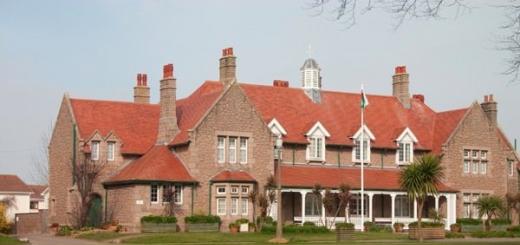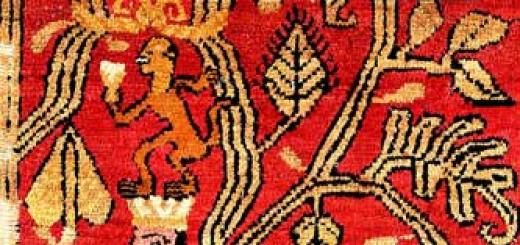(function(w, d, n, s, t) ( w[n] = w[n] || ; w[n].push(function() ( Ya.Context.AdvManager.render(( blockId: "R-A -143470-6", renderTo: "yandex_rtb_R-A-143470-6", async: true )); )); t = d.getElementsByTagName("script"); s = d.createElement("script"); s .type = "text/javascript"; s.src = "//an.yandex.ru/system/context.js"; s.async = true; t.parentNode.insertBefore(s, t); ))(this , this.document, "yandexContextAsyncCallbacks");
I am often asked how to communicate with the Chinese (make purchases, order food in a restaurant, find out the way, etc.) without knowing Chinese. In far from everyone speaks English, and those who speak - often with a monstrous accent. How to be? I addressed this question to my mother, who has been to many times. I give her the floor.
The Chinese language is so difficult that few people will learn it if there is a short-term one. Moreover, you can do without knowledge of Chinese literacy. When I come to , Shanghai and some others Chinese cities I lead an active lifestyle, although I do not speak or read Chinese. I walk the streets and parks, visit temples and museums, buy food and things in shops and street vendors. We have to bargain (it is impossible without it), greatly knocking down the price. Worth mentioning and public transport, which can be used by any foreigner who does not understand a single word of Chinese.
I want to say right away that I have never been in the Chinese outback. But more or less major cities and in Chinese resorts, I sometimes forget that I am in a foreign-speaking environment. How do I do it? Very simple. You just need to have an idea about, take into account their traditions, know a few oral phrases and distinguish at least a dozen. I almost forgot, be sure to have a bilingual map of the city in your bag (in Chinese and English), and in your pocket a compass (it’s easier to navigate) and a notepad with a pen ( or navigator in mobile phone, but I had situations where it didn't work; therefore I always carry a printed map of the city with me - M.A). For those who for some reason have not mastered chopsticks, it is worth having a knife and fork (conveniently plastic) with you.
Modern Chinese are always ready to help a foreigner. They will try to find a way to communicate with you. The younger the Chinese, the easier it is to contact him. It is more difficult with older people or with those who have recently arrived from the village.
Learning Chinese Literacy
If you want to win over any Chinese (starting with passport control at the airport), then smile and politely say no hao你好, which means "Hello". In taxis, shops, markets and other places, repeat this magic phrase like a spell. Contact is immediately established between you and the Chinese. It's also good to remember the words "thank you" sese谢谢 and "goodbye" zai jian 再见.
Another phrase will save your life. She sounds questioning. La de ma?辣的吗, which means "Is it spicy?". A Chinese chef or waiter will understand your fear and put less pepper in your food. Or suggest another dish.
If you urgently need to show that you do not want something, or you need to suspend some action, then say “No!” or Russian "No!". These words, plus your intonation and the corresponding gesture, will be a signal for any Chinese that it is necessary, at a minimum, to clarify the situation.
There are several hieroglyphs that it is desirable to memorize to the extent that you recognize them on products, signs and menus. It is: "beef" (牛肉 niuzhou), "pork" (猪肉 zhuzhou), "chicken" (鸡 chi), "horse" (马 ma), "fish" (鱼 yu), "milk" (牛奶 sniff), "vegetables" (青菜 qingcai), "salt" (盐 yang, pronounced like day), "red" (红 hong; for black tea, which is called red in China), "green" (绿 lui), "tea" (茶 cha), "water" (水 Shui). It is useful to know the characters for "entrance" (入口 beetle), "exit" (出口 Chukou) and "stop" (站 zhan).
To fill out various questionnaires and forms (starting with an airplane), you need to remember how to spell “Beijing” in English - “Beijing” (or the city where you are flying). The name is pronounced like Beijing, i.e. " northern capital". The Chinese spelling for Beijing is 北京.
In public transport
As soon as there are any problems, I turn to any passerby. If his knowledge of English does not allow us to find a common language, then I take out the metro map and show the station I want to get to. They either point me in the right direction, or escort me to the place from where it will be easier for me to get. In addition, there are always metro employees at the station who will help you find your way.
It happens that older people shrug their shoulders and walk away. They would be happy to help, but they are afraid to do something wrong. The upbringing of past years also has an effect: distrust of strangers. Today's youth is completely different. As soon as I stop, studying the map, as soon as someone comes up and asks in English if you need help?
For convenience, it is better to immediately buy a card (metro + bus) and always have a supply on it. If there is no desire to understand the operation of modern machines through which the account is replenished, then you can approach the metro workers, show them with your hand at the machine, card and banknote. They will come up and put the card and money in the right slot in front of you and press some buttons. If the workers are busy, then you can contact any Chinese.
I rarely use buses, although they are modern and very comfortable. I'm more used to the subway. A single card (for the metro and buses) saves me from looking for a place to buy tickets. With questions (which bus, where is the stop, when to get off?) I turn to the passengers. There will always be someone who knows English. You can also show the desired location on the map.
It is advisable to have a piece of paper with the address of the apartment or hotel, which is written in hieroglyphs. She, as well as a specific place on the map or a business card of the seller, can be shown to the taxi driver.
There are also rickshaws. They are usually taken to travel short distances. The price is negotiable, from 5 to 10 yuan. Ten fingers will help determine the price.
In shops and markets
There are many shops in China. The most different. There are huge international chain supermarkets: Carrefour ( carrefour, 家乐福 jialefu), Walmart ( walmart, 沃尔玛 voerma), "Auchan" ( Auchan, 欧尚 ocean) and small (in "step by step" and "half step" accessibility). Prices for groceries in small stores are often lower than in chain stores. The price is not per kilogram, but per 500 grams (斤 jin). In grocery stores with a cash register are not traded. There are no problems with not knowing the language, if you limit yourself to buying familiar products. The pictures on the bags help to identify what is in the opaque packages. Saves and the accompanying inscription on English language. Acquaintance with some hieroglyphs (“beef”, “milk”, etc.) will come in handy.

Saved English is yogurt
Do not reject the help of the seller, even if it seems unnecessary to you. A couple of years ago, we chose a comfortable and lightweight backpack. Such that the back breathes, the shoulders do not get tired, there is a strong zipper, many pockets and a place for a laptop. The salesperson stood by for a while, watching us. Then she went to another rack and brought exactly the backpack that met our needs.
On several occasions, vendors have literally “taken away” my bottle of olive oil, a package of eggs, and other items, bringing fresher, tastier, or cheaper alternatives instead. In the same way, we were able to taste the wonderful Chinese dry red wine that the vendor offered us instead of the one we chose.
Another thing is the market. Trade for health. To the question "How much?" (“How much?”) the seller will most likely answer in Chinese first. Then draw a question mark in the air and shrug your shoulders. Immediately in the hands of the seller will be a calculator or a phone, which will indicate a greatly inflated amount. It must be lowered by pressing the buttons of the calculator and using gestures and facial expressions. Name your absurdly low cost. This will be the start of the bargain.
Show with all appearance that you do not like the product, that it has flaws. Speak in any language that you take it not for yourself, but for a friend. You do not need this thing, it is small (large), does not match in color, etc. The more details, the more convincing your arguments. At the same time, each of you speaks your own language. You can even pretend to be disappointed and leave. By some instinct, the seller will understand you, appreciate and agree to a compromise price. Of course, at first he will run his hand over his throat, showing how hard it is for him to give away goods for such pennies.
The Chinese bargain willingly, with pleasure. If it is possible to reach a common language (English or Russian), then such an argument will do. Listen to all the arguments of the seller. He will tell you for a long time at what price he buys goods at the factory. Agree with him. Tell him that you don't want to interfere with his business and deprive him of his profits. And for a gift to friends (neighbors), this product is too expensive. You change your mind and buy something cheaper elsewhere. Write for persuasiveness the cost in yuan, multiplied by 5 or 6 (at the current exchange rate of the yuan against the ruble). Horrified by the result, saying that in Moscow you can buy the same thing much cheaper. Not a single Chinese seller will let go of a buyer who has come to him. He will take out a calculator (a piece of paper and a pen) and start haggling. In an extreme (hopeless) case, ask for a discount. Usually they don't. But this option is possible if the seller and you speak at least a little the same language.
Bargaining (in full) will not work if a person (often an elderly relative) who is asked to look at the goods is selling. He will call the owner of the goods a hundred times and consult with him about discounts. It can immediately show that bargaining is not appropriate, after which it will lose interest in you and go about its business. In this option, even an excellent knowledge of the Chinese language will not save.

Beijing's Yabao-lu Street is considered "Russian": many vendors here speak Russian
Help from a person who knows Chinese
Many times I found myself in a situation where it was necessary to urgently resolve some economic issues with the Chinese, who did not speak other languages. She immediately took out her phone, dialed the number of Chinese acquaintances and gave them the phone. After about five minutes, the interlocutors explained to each other the essence of the issue (with all the details), after which they told me what to do. This way of communication allows you to contact workshops for the repair of things, order drinking water, etc.
China has a wide variety of food. For every taste. It is very easy to navigate, as most of the menu (often thick books) is accompanied by pictures of dishes. Many restaurants have special menus for foreigners. Speaking of sticks. I love to eat with a fork and knife. I do not want to give up this habit and switch to sticks. In most restaurants, you can ask for a knife and fork (often with gestures). Sometimes I have to use the plastic kit that I always have in my bag. The Chinese don't care what you eat.

You can’t do without the help of the Chinese when filling out such a menu.
In small "dumplings", where they cook incredibly delicious 饺子 ("dumplings") with various fillings, the menu is usually in Chinese. In this case, the "cheat sheet" that you will show to the waiter will help. It must be written in advance by a familiar Chinese or a person who speaks Chinese, indicating what filling you like.

It is clear that inside - dumplings
I love Chinese baozi 包子 (steamed stuffed pastry). I buy them by showing a notebook with a list of toppings that I like. They are written in hieroglyphs (for Chinese) and in English (for me). In order not to take a lot of time, counting the total cost, I hold out a deliberately large bill and take the change. There has never been a scam.

Some restaurants will tell you everything in English
Don't be afraid to be funny
Once I needed to buy a cream that protects against scorching sun. First I went to the nearest supermarket. In the cosmetics department, the young saleswomen knew only Chinese. I had to get a notepad and a pen. Draw a man and the sun. Write + 30 ° C and show how I will smear the face and body with cream. She said the clarifying word "Hainan", a resort in southern China. The saleswoman understood everything and brought two tubes. She gave one and touched her lips and eyelids with clearly forbidding gestures. The other tube had no contraindications. I nodded my head and made it clear that I was taking both tubes. After that, the saleswoman took them to the checkout, wrote the price on a piece of paper, and only after my consent punched the goods. I put it in a transparent bag along with a check and gestured to the floor below (there were cash desks), making it clear that I would need to show this bag. When buying, a small pantomime was played. None of the outsiders paid any attention to her.
There are words in Chinese and Russian that are understandable both to us and to the Chinese. For example, "tofu" 豆腐, "ginseng" 人参, "mango" 芒果. I bought ginkgo extract tablets that are very useful for the body without a translator at a pharmacy. I was well understood. When buying tubes with the famous Chinese ointment "999", a panacea for many ills, it was enough for me to write three nines on a piece of paper, agree to the price and pay for the purchase at the box office, to which I was led.
Our acquaintances in Beijing had difficulties with the lack of liquid for storing contact lenses. They were never solved, as an independent attempt was made to find the Chinese character, and not to let the Chinese help in solving this problem. It was necessary to show in a pharmacy or in a store that sells glasses an empty lens case that needs to be filled. It was possible to clarify the wish with a drawing. Then the Chinese would offer a choice the best remedies famous firms. China is a country of bespectacled people and people who use lenses. Everything that concerns optics is well developed there. There is no lack of care products.
This is just a small fraction of those techniques that help you feel in China without knowing the language. China is a livable country where you can always find options for communication. In some cities there are quarters and streets, with inscriptions in Russian, sellers who have studied Russian. However, it is easy to navigate and solve your problems, even if you find yourself in a Chinese environment without knowing the language.
MA: If you are going to China, it is useful to write down some useful hieroglyphs on a piece of paper and on your phone that will help you navigate. In addition, there are various mobile applications - translators. I use dictionaries "Lingvo"(Russian-Chinese and Chinese-Russian) and Pleco(English-Chinese), as well as Google Translate.
Even if you do not know Chinese, set your phone to Chinese, and there are two options: using the phonetic pinyin alphabet (syllables written in Latin) and by writing the hieroglyph on the touchpad. In case of any problems, you can ask the Chinese to write an unfamiliar word or phrase on the phone and then translate it into Russian.
Perhaps, after reading this article, you still decide to learn Chinese. Then read the post.
© Site, 2009-2020. Copying and reprinting of any materials and photographs from the site site in electronic publications and print media is prohibited.
To visit China and not visit the Great Wall of China is a crime. True, here, as elsewhere in China, there is a problem of choice: to go by yourself or with organized tour, but here it is further aggravated by the question: where exactly to go, to which section of the wall? Let's share our trials and errors in this matter.
How to go?
China is probably the only country we have visited where I am ready to advocate for organized excursions. For 2 months spent here, I'm already rather fed up with the fact that nothing works out the first time, and the information in guidebooks very often differs significantly from what it really is. But on the other hand, excursions for foreigners in English from official travel agencies cost some space money, and with a budget option, there is a risk of riding a bus full of noisy Chinese or spending most of the time not walking along the wall, but visiting tea shops and onyx.

In addition, an excursion to the Great Wall of China is one of the most popular layouts of the Beijing “Ostap Benders”. It looks like this: on the street, a barker sticks to you, who convinces you to buy an excursion to the Great Wall of China from him. He says that he has been working at this place since the time of Comrade Mao himself, his excursions are the best and cheapest, shows photos of satisfied customers and claims that a line of tourists is lining up for him, but he liked you and therefore he will be happy to take you tomorrow.

He broadcasts this very eloquently and convincingly, and you almost agree, especially since the kind "guide" does not even ask you for the entire cost of the tour at once, 20-30 percent, to reserve your place. He “swears by his mother” that he will not deceive you and will pick you up from the hotel at the appointed time tomorrow. But then tomorrow comes, and there is no bus, there is no guide in “his place”, there is no money either.

We were warned in advance about the possibility of such a layout, as well as about it, and therefore we immediately rejected such proposals, and I want to note that there were quite a few of them. Having compared all the pros and cons, we once again chose an independent inspection, and we never regretted it, almost ...
Where to go?
At present, several sections of the wall are open for inspection: Badaling, Mutianyu, Simytai, Jinshanling, Huanghua, Jiugulou. After studying the guidebooks, the vast expanses of the Internet and travel forums, we came to the conclusion that on our own in one day you can only get to the first two: Badaling and Mutianyu. Badaling is the most accessible section of the wall and therefore the most visited, so we initially decided to go to Mutianyu.
Mutianyu
So, in theory, to get to Mutianyu, you first need to find bus terminal located at the metro station Dongjimen. Everything is aggravated by the fact that you do not need the main terminal, which is located near the metro, but some additional one. Finding it is not easy, since there are no signs, and all the verbose descriptions on the Internet are really of little help. It's good that we always try to give the exact location of the objects you are looking for on the map, and you will not have such problems.

After you have found the bus station with grief in half, you need to go into the very depths, there will be a stop for the bus you need, or rather buses, since we found information that buses either 867 or 936 go to Mutianyu from this station. More one important detail, according to the information we found, the bus route 867 leaves at 7:00 and 8:30 in the morning, so you have to get up early. We arrived at the station around 7:30 and bus 867 was already (or still) at the stop, we showed the driver the hieroglyphs recorded in advance, to which he explained with gestures as best he could that he was not going to Mutianyu, but was going to the place from where we should go by taxi. Ok, we decided, so the 936th definitely goes where we need to. And they began to wait for him (by the way, the 867th bus left at 8:00).

In addition to us, there were some Japanese, Chinese with cameras and a European with a Lonely Planet guide at the bus stop. By the way, he twirled a little between the buses and quickly retreated somewhere. Somewhere at 8:30 the coveted bus arrived and we merrily plunged there. Moreover, there was a real feeling that a baby was swarming around you, in my memory only schoolchildren can change their place so many times. Before departure, the conductor approached us and asked where we were going, in Chinese, of course. By the way, in Xian, when we went to see the terracotta army, the conductor spoke excellent English, what does it mean.

In response to this, we, as in the case of the previous bus, showed her pre-prepared hieroglyphs and got ready for departure. But it was not there. Our hieroglyphs did not suit her for some reason, she, along with the driver, began to make some noise, scream and actually pushed us out of the bus. What it was and why, remained a mystery to us, as well as the whole of China)))
Accustomed to the fact that we can’t do anything the first time in China, we decided to try our luck the next day, but for now, go see the Olympic facilities. Since we did not want to tempt fate with the conductors and Mutianyu again, and therefore we decided to use plan B, i.e. go to Badaling.
Badaling
Of course, this is the most touristy of all the possible wall options, but there is a train going there. And the train for us - The best way to get to difficult sights, which helped us out more than once, for example in Kunming, when we .

So the trains to Badaling are recovering from northern railway station, he is at the station Xinhimen. All trains in the direction we need have a 4-digit number, start with "S2", and then 01-99. At the same time, odd numbers go to Badaling, and even numbers go to Beijing. By the way, this direction appeared not so long ago - it was built for the Summer Olympics in Beijing.

The train schedule is posted on the stand, but in China everything changes so quickly that I do not spoil for its relevance. Tickets are sold on the same day, that is, they cannot be purchased in advance. The procedure for traveling in that direction is approximately the same.

You buy a ticket at the box office (by the way, it costs only 6 CNY), you go inside the station and run into a queue. The Chinese have an unrealistic love for queues: they first create it from scratch, and then they try to deceive everyone and crawl around. But there's nothing to be done - you have to stand, as the metal guides very strictly regulate the order of the most nimble tourists. They let you onto the platform 15 minutes before departure, and then the fun begins ...

The fact is that the train is quite far from the station building. Therefore, having stepped onto the platform, everyone cheerfully runs to the train, hoping to take their seats. The attraction is the same, especially considering that the curb tiles on the platform are very slippery and this run can easily end in serious injuries.
An interesting observation, for some reason the Chinese prefer to climb into the very first carriage closest to them, and then move further inside the train. If you are not too lazy and run to the end of the train, the probability of taking a seat increases significantly.

One and a half - two hours on the train and we are there. Then the whole crowd cheerfully falls out of the train and goes towards the wall, about 10-20 minutes, depending on the speed and the number of photos taken along the way. It is important to remember that Badaling is not the final station, but since the bulk of passengers get off exactly Here
I’ll tell you separately about our railway experience and how we got food on this trip. We made all our movements between cities in China by trains.
These were our food requirements. It's good when the cafe has a menu with pictures. I generally like dishes with sweet sauces, although I can't eat a lot of them. But Lena did not like them.
In general, the Chinese have a special love for sweets - it is almost impossible to even find non-sweet bread. We did not find bread in our understanding there at all.
All the sausages that we tried, although they looked like ours, they tasted disgustingly sweet.
The potatoes are all sweet too.
By the way, we liked the Chinese beer.
As a result, we have developed our own set of requirements for dishes:
- 不辣 - búlà - not spicy,
- 不甜 - bùtián or 不加糖 - bùjiātáng - not sweet,
- 没有豆腐 - méiyǒudòufu - without tofu.
Still sometimes you need to say that the dish is packed for us to go. We just showed this phrase written in Chinese. It's time for us to learn it already:
请把这到菜给我包 - Qǐng bǎ zhèdàocài gěi wǒ bāo.
Maybe you will need it on your journey.
One day we tried to order baozi. The menu had no pictures. We saw the familiar hieroglyph 鸡 - Jī - chicken. We were delighted - we decided to order baozi with chicken filling. They were delicious, but we didn't find any chicken there. There was 鸡蛋 - Jīdàn - egg. We knew how the word sounded, but we didn't remember how it was spelled.
A good review about Chinese food was written by the owner of the Way2China blog Anna in the article What and how the Chinese eat.
Made it 65 minutes before departure. I vowed to drive up to the departure on the train back to back in time.
LESSON
- Before large transfers, flights, leave a day in the city of departure - after all, there is always where to take a walk there, and you will definitely not be late for the plane.
Despite the fact that China is becoming more and more popular with tourists from all over the world every year, the reviews on the Internet of our compatriots about trips to China are, to put it mildly, ambiguous, so let's talk about those features of the country that may be unacceptable for some travelers.
1. If your passport is valid for less than 6 months from the end of the planned tour, choose another country
The Chinese consulate strictly observes all documentary formalities, therefore, in order to avoid problems with obtaining a visa and disrupting the trip, it is better not to take risks and take care of a new passport in advance.
2. If you are not ready for the extra hassle of obtaining a Chinese visa
There is nothing fundamentally difficult in preparing documents for obtaining a Chinese visa - no extra certificates are required, only a passport, an application form, copies of a Russian passport, a photograph and an invitation from the Chinese side. Consular fee under tourist trip- 1500 rubles. Moreover, if you are planning a vacation in Hainan, then when you take a direct flight from Moscow, you do not need a visa at all!
Mountain Lake in China
3. If you basically fly only on charter flights, then - alas!
You can get to China only by regular flights of Hainan Airlines, Aeroflot, etc. Airplanes fly from St. Petersburg to Beijing on Wednesdays, Fridays and Sundays. Accordingly, the duration of the trip should be "customized" to the schedule of the airline. Flight time is about 7 hours.

China
4. If when traveling by train you are used to buying a full compartment to feel comfortable, then in China you will have to fly by plane
In China, it is impossible to redeem a coupe in whole or in part, that is, if the program excursion tour If you plan to travel by train between cities, then you will have to share a four-seater compartment either with tourists from your group or with the Chinese. double coupe does not exist. As a rule, transfers between cities are overnight and last about 12 hours, for example, between Beijing and Xi'an.

One of the entrances to the Forbidden City
If this issue is fundamental for you, there remains the option of moving on domestic flights. By the way, China has a very developed air service and a fairly high level of flight safety. Baggage rules in hand luggage even more stringent than those accepted worldwide.

China
5. If you cannot tolerate tobacco smoke, choose another country or stock up on a respirator
The Chinese smoke a lot. Accordingly, almost everywhere it smells of tobacco, smoky rooms come across in hotels, and guests also smoke in hotel lobbies. It is forbidden to smoke in train compartments, in restaurants you can choose a room for non-smokers.

Chinese outback
6. If you are on a special diet or are very selective about food, take your favorite (preferred) foods with you
A lot has been written and told about the fact that Chinese cuisine is very peculiar, but how much it suits you personally, you will understand only, so to speak, “on the spot”. Someone lacks meat - indeed, the basis of the Chinese diet is steamed, boiled, stewed vegetables, noodles and rice. Someone does not tolerate spicy and salty. If in Beijing, Shanghai and other large cities you can still find food adapted for a European, then in the provinces this will be a problem. You will find cutlery familiar to us only in large cities, in the outback you will have to eat with chopsticks. Of course, in China there are places chosen by the British and Americans, where both the kitchen and other amenities are on highest level, For example, nature reserve pandas, but this is rather an exception.

Giant Buddha statue, Leshan
7. If you experienced culture shock when visiting public restrooms in the former Soviet Union (or in modern India) and no longer want to see them again, then choose another country to travel.
All public toilets in China are free. Tourists who have found Soviet "conveniences", seeing Chinese ones, think "scoop". Indeed, very similar: two soles and a metal bowl at floor level, no toilet paper and a corresponding smell. So for those tourists who still go to China, advice is to take toilet paper and wet wipes with you.

8. If you prefer silence and solitude, and your personal psychologically comfortable space is one and a half meters - choose another country
There are many people in China. Even not so - there are VERY MANY PEOPLE in China! This fact actually entails a wide variety of consequences, namely: everyone constantly touches each other with elbows and other parts of the body, they talk quite loudly, therefore very noisily, they look at everything interesting and unusual with sincere, but completely unceremonious curiosity, for example, you

Against the backdrop of the Great Wall of China
9. If the budget of your trip involves an amount of less than 50 thousand rubles per person, then you need to choose another country or take a loan
The most budget option for exploring China is a week-long tour to Beijing. Today it costs from 50 thousand rubles per person. If you want to see more Xi'an (terracotta army) and Shanghai within a week's stay, count on the amount of at least 70 thousand rubles per person. In order not only to see the main cities, but also to relax on Hainan Island for a week, budget from 100 thousand per person. Treatment in China is very popular among the stars of domestic and international show business - both in the central part and on the island of Hainan.

In order to feel comfortable when planning a tour and directly on a trip, you can use the installment payment service offered, for example, by our company for up to 7 months at 0% per annum.

Village with rice fields, China
10. If your vacation falls during the Republic of China Day or Chinese New Year celebrations, go to another country
In China, there are two grandiose holidays - this is the day of the founding of the People's Republic of China and the Chinese New Year. During these periods - from 28.09 to 04.10 and the last decade of February-early March (celebrated on lunar calendar, so there are no exact dates) - China has official public holidays, and all Chinese begin to travel in droves within the country. Hotel prices are tripled, and pandemonium begins at tourist sites. So it is better to plan a trip for other dates. Perfect time, especially for combined tours- this is spring and autumn, when it is warm on the mainland and it is still not very hot on Hainan Island.

Among other tourists, China
In conclusion, I want to say: I am sure that a trip to China will not leave anyone indifferent. Our tourists return from this diverse country with invariably positive impressions.

Panda
If you have any questions, write to: [email protected]
“Do you want to go to China alone, without a group of tourists?” an employee of the Khabarovsk travel agency looked at me with undisguised horror. “You will get lost there, if only because you don’t know the language!” "I assure you, everything will be fine, just help me get a visa!" I insisted.
The desire to see the Middle Kingdom was so strong that the instinct of self-preservation dulled, and the inner voice persuaded to fly, because "there are so many interesting things!" At the same time, I wanted to move around the country on my own, without the standard tourist "look left, look right." It turned out that this is not difficult at all. Moreover, in my opinion, this is the most correct way to see the country in all its diversity. Of course, it would be nice to have acquaintances in China - this way the most difficult issue is automatically solved - with the language. In addition, knowledge of the local flavor and advice from "insiders" can significantly reduce not only your transportation costs, but also insure against financial losses, and in some cases save your stomach.
To the language barrier!
Before the trip, you need to be aware that in China everyone speaks only Chinese. English is used very little, mainly in big cities- Beijing, Shanghai or Hong Kong. At first, of course, it is difficult to get used to: all signs, announcements, schedules and menus consist of hieroglyphs, which are rarely duplicated in English. At first, a phrase book saved me, in which there was not only a transcription of Chinese words, but also their spelling. After long training, of course, I learned how to correctly pronounce basic expressions like "hello" and "how much", but I realized for myself that it is better to show more complex phrases by pointing your finger at the book. The fact is that there are so many dialects in Chinese that a Chinese from the north will never understand a southerner, and vice versa. For example, "forty-four" in northern will be "si shi si", and the inhabitants of the south say "si si si" - something like "shorok setyre". The official language is Putonghua - translated as "common language". To teach its citizens to speak the same way, the government is making many efforts. You turn on some kind of radio, and instead of music, only Mandarin conversations all the way.
Where and how to go
Southern China is good at any time of the year. It is better not to go to the north in winter - the weather practically does not differ from our Central Siberian one. When choosing a route, you need to take into account your financial capabilities and the duration of the visa. For those who want to start their journey from Beijing, it makes sense to take a ticket for a direct air flight (about five hundred and fifty dollars round trip), and from there travel around the country by train. If you are limited in time, then you can fly from city to city and by plane - fortunately, in China they are affordable. I will tell you more about the railway communication. Tickets for any direction can be bought only at the railway station ticket offices. The only problem is explaining which ticket and where you need it. Moreover, it is desirable to do this in Chinese, because even if the station has a window with a sign "Foreigners" ("Foreigners"), it is not a fact that the cashier girl speaks English.
You need to arrive at the station 20-30 minutes before the train leaves - this way you will pass the control relatively calmly. The train will depart minute by minute, and as soon as you get into a "traffic jam" of the Chinese who want to leave with you, write wasted.
There are several classes of Chinese wagons:
The cheapest - no seats. In them, passengers stand or lie on the floor - on newspapers, on anything; Sedentary. It is better not to take risks if you go far, and your back is naughty; Hard-slippers, reminiscent of our second-class sleepers, only shelves in three tiers, the bed is already made, but there are no side seats; Coupes, which are similar to Russian ones, only the carriages are much cleaner, the beds are ruffled, there are carpets on the floor. Every train has a restaurant car - after all, the Chinese are constantly eating something. In all trains, the washstands are located in plain sight, separate from the toilet, and thus, the morning queue for the closet is a rare occurrence. But you can, for example, enjoy the spectacle of the morning washing of the false teeth, which an unfamiliar Chinese grandmother does with great care.
I traveled from Beijing to Jinan in a hard-slipper (about 6 hours), and the ticket cost me 73 yuan - in terms of our money, about 200 rubles. The price of a ticket from Beijing to Shanghai (a night on the road) is 250 yuan, that is, about 685 rubles. Inexpensive, but for example, it was difficult for me to get used to Chinese trains. Basically, due to the fact that passengers constantly smoke, eat Doshirak noodles, talk loudly and without hesitation - both men and women - walk around the car in underpants.
Where to live and what to take with you
A room with breakfast in a four-star hotel in the center of Harbin cost me 300 yuan per day (eight hundred and twenty rubles). The hotel was not bad, but only Chinese people lived in it, and the staff did not understand a word of English. Attempts to ask where they have a gym looked like helpless flickering with their hands - with the aim of gestures to show the "simulator", and requests to wake them up at a certain time caused confusion among the receptionist.
Hostels - youth hostels can become a more economical accommodation option for young people. One bed in a double room at the International Youth Hostel, which is located right next to central station in Beijing, it can cost 70 yuan (200 rubles) per day. Everything you need for life is available: a shower, a 24-hour bar and an Internet cafe. By the way, you can save even more if you stay in a "dorma" - a room with 3-12 beds and amenities in the corridor. Depending on the city, such accommodation costs 20-60 yuan (55-175 rubles) per night.
I will add one more to this standard set of hotel search tools - touts - the option to settle in private apartment. People offering "cheap apartments in the center of Beijing" huddle at train stations and ask for very little money. I have not tried it myself, but knowledgeable travelers assure that they should not be afraid - here, unlike, for example, in India, there is no danger that there will be any problems with these apartments.
When traveling, I advise you to take a comfortable backpack, good sports shoes - for long hiking, a thermos (boiling water is available everywhere and for free) and more of some small souvenirs such as nesting dolls - the Chinese love to receive gifts and can even help you somehow as a thank you.
What to watch in China
Of all the cities, the most impressive is, of course, Beijing. Or, as foreigners call it, Beijing. After I visited it, it's easy to understand Quentin Tarantino, who came here to shoot his film "Kill Bill", but could not leave. I bought an apartment in Beijing and, according to rumors, eventually plans to completely move to the Middle Kingdom. The city shocked me with its monumentality. I expected to see crowds of crazy-eyed Chinese rushing somewhere, crowds in the streets, traffic jams. But none of this happened. The flow of people moved smoothly and without hysterical hustle, as in Moscow.
In architecture, two main directions are connected here: eastern and western. The first is represented by pagodas, with easily recognizable upturned roofs and obligatory dragons as a design element. The second - skyscrapers, which here do not block the space at all.
Everyone who comes to Beijing for the first time begins their tour of the city from the famous Tiananmen - Heavenly Peace Square. It is the largest in the world, it can accommodate one million people! It is always crowded here - not only because of foreign tourists, but also because of the Chinese, residents of distant provinces, who come to be sure to take pictures at the mausoleum of Mao Zedong. Both adults and children in the square run kites. Here you can also buy your snake - in the form of a shark, butterfly or other monster.
On the square, I noticed a small child - 3-4 years old, who had a hole in the back of his pants and his naked butt was blown by the wind. I thought it was an oversight of the parents. But then I saw a few more kids with the same strange cut of panties. It turned out that thrifty Chinese do not like to spend money on diapers. The child wanted to use the toilet, sat down - and you're done!
In the mornings, at six o'clock, the Chinese go out to the square and do group taijiquan - a melancholic exercise, the meaning of which is sluggish hand passes and careful stepping from side to side.
Not far from the mausoleum of Mao is the entrance to the Forbidden City - huge complex palace buildings where the great emperors of the Qing and Ming dynasties lived. Hundreds of pagodas, thousands of courtyards - the spectacle is striking in its scale. Previously, mere mortals were forbidden to enter here, but now you can - for only 10 yuan (27 rubles).
Leaving the Forbidden City, you find yourself in the wonderful Beihai Park (Park north sea), where the crowned persons rested, apparently indulging in thoughts about the fatherland. Needless to say - the Chinese know a lot about landscape architecture. Half of the area is occupied by a lake, around which weeping willows of crazy beauty grow. This park is adored by couples in love and calligraphers. The first - because it is allowed to kiss quietly on the benches, the second - because you can draw hieroglyphs with water right on the pavement.
From the park you can walk to the famous Temple of Heaven. This is now China, probably the most unbelieving country in the world (ninety-five percent of atheists). And before they believed in the Sky and other deities. The road to the temple is already a test. It takes about half an hour to walk along a narrow stone path. It was very instructive when, panting and wheezing, at the last stage of the ascent, I was overtaken by a wizened old Chinese woman who overcame the path easily and naturally.
On the territory of the temple there is a Wall of Whispers. It is semicircular in shape, and this allows you to hear the interlocutor, even if he is standing a hundred meters from you and muttering something under his breath. The Chinese love to have fun, standing at the wall for hours at a distance from each other and talking.
Fewer discoveries awaited me in Shanghai. Maybe because it is very modern, or maybe because I did not stay there for long. As soon as this city was not called at different times: both the "Paris of the East" and the "Chinese Whore" ... This is a city of adventurers, players, sailors, opium dealers and opium addicts, a city of child prostitution and slave child labor, a city of socialists, communists and revolutionaries , the birthplace of the Chinese Communist Party, the cradle of the Revolution and the birthplace of the Shanghai Commune. It is home to 6.5 million people - one of the highest population density in the world. There are a lot of skyscrapers here. And they, unlike Beijing, crush. Fashionable buildings easily coexist with old buildings, from which ropes with linen strung on them stretch in all directions. It’s not at all shameful to hang out old faded shorts and breeches for everyone to show off.
In the center of the city there is a wide paved space of the People's Square. Processions and demonstrations were organized here. In 1969, 2.5 million people gathered on the square to protest against the Soviet Union. And now the walkers peacefully feed the pigeons.
On the streets you can see both young yuppies and informals. During the walk I happened to meet real Chinese punks. They had a very worn look, despite the traditional hedgehog hair, spiked jackets, grinders and guitars on their backs. Themselves are skinny and unkempt. When they tried to play something from "Sex Pistols" in front of the department store, I wanted to go over and feed them a hot lunch.
Walking in Shanghai is a must. Better - along Nanjing Lu, the main street. Bright shop windows, neon signs everywhere. And shops, shops, shops. Nanjing Lu leads to the embankment of the Huangpu River. Once upon a time in colonial times, a famous sign hung at the entrance: "Dogs and Chinese are not allowed to enter." Today, crowds of Chinese and foreigners roam here, admiring the view of the night Band.
Rotten eggs and duck skins
It is often joked about the Chinese that they eat everything that flies except airplanes, everything that moves on land except a tractor, and everything that floats in water except a submarine.
Chinese chefs profess the principles of culinary art that have developed five thousand years ago. They love unexpected combinations of products: meat with sugar and fruits, seaweed with nuts, flower petals with hot peppers, hedgehogs with spices. In order to cook the broth, for example, they can take beef, poultry and fish at the same time.
There are about 14 culinary schools in China, the most famous of which are Shandong, Sichuan, Jiangsu-Zhejiang, Beijing and Guangdong. The latter is the most "extreme". It uses snakes, field mice, wild cats, dogs, fur seals, crocodiles, bear paws, monkey brains, bird tongues. The technology of some dishes is simply savage. "Kunming Lake Fried Carp" takes only four minutes to scrape off the scales, butcher, toast and serve. When the fish is served on the table, it still opens its mouth and the gills move for thirty minutes. This agony continues even when the fish is eaten to the bone. The secret of such vitality is that the head of the fish is not fried and the central nervous system is preserved. In general, Greenpeace is resting.
"Queen of the Chinese table" - Peking duck. Instead of a duck, however, they bring duck skins, which the tourists are very surprised at. But if you come to a fish restaurant, it’s hard to make a mistake here: everything swims in aquariums. You approach, you choose - and in ten minutes you are already being served a dish. True, it was difficult for me to come to terms with the fact that the selected fish was killed with a shoe in front of my eyes, which is why its insides are scattered throughout the restaurant.
The Chinese also love rotten duck eggs. To cook such an egg, it must be kept in lime for 30 days! Its yolk is black and has an indescribable taste. Protein - like rubber, almost transparent in appearance.
In a restaurant of an average level and below, the Chinese "of an average level and below" behave completely, from a European point of view, like a pig: they blow their noses and spit right on the floor, throw off napkins, bones and leftovers there, yell at the whole room, especially when will drink. By the way, they also expectorate on the streets - loudly, wiping their nose and mouth with their hands. Even women.
The Chinese love to put food on each other's plate. And when they bring the bill, a serious argument flares up between them: who will pay. Everyone strives to do this for everyone in order to prove their privileged position. Our compatriots are happy to go to restaurants with the Chinese ...
Behavior Observations
The Chinese are very noisy people. Their guttural voices are one of a kind. Once in the US there was an anecdotal incident. Two people from Guangdong province were having a peaceful conversation, but the Americans passing by thought that they were about to quarrel and called the police. The police demanded clarification, but two interlocutors replied that they spoke in a "whisper".
Why are they screaming? The Chinese believe that the stronger and higher his voice, the more convincing his arguments look.
In a country of nearly 1.3 billion people, more than a quarter of the population regularly participates in sports. Mass physical education covers all educational institutions, enterprises and institutions, villages, units of the People's Liberation Army of China, the elderly and the disabled. The Chinese habit of doing group exercises is known all over the world. Moreover, they do it at different times of the day. Many work in groups and to music, but there are also individuals. There are athletes with sticks. They wave them in the manner of Shaolin monks right on the streets.
It is very common to see people walking backwards. Probably, this is an exercise for the development of the vestibular apparatus. In every city there are courtyards equipped with shaping equipment, available to everyone, and free of charge. The old men famously throw their legs on the tall railings, and sometimes sit on the twine. And since millions of Chinese pedal their bikes daily to and from work, their legs are pumped up.
Against the background of the craze for sports, the Chinese smoke and drink a lot. Vodka and cigarettes are sold everywhere, although the quality is terrible. There are 320 million smokers in China, of which 20 million are women. Hence the large number of "nicotine deaths". But no one indulges in addiction on the streets - the Chinese prefer to do it in a calm environment: in a restaurant or bar.
In general, I am satisfied with my trip. Maybe I didn’t see this country from the most romantic and glossy side, but, in any case, the trip left a lot of impressions and memories.
Yes. I agree with the previous comment that Beijing has long faded before Shanghai and Hong Kong, and resembles Moscow in the 80s, where the author saw so many unusual things there, it’s incomprehensible, for me Beijing is always the other way around only a transshipment base, other Chinese cities are much more interesting, in this case I don’t have in mind cultural monuments, of which there are many in Beijing.
25.07.11
Natalia
indeed, the commentary is very detailed. but it seems that the author visited China 10 years ago (the description of Shanghai is exactly 10 years old, the spirit of communism does not hover there, definitely). although, perhaps, if you ride around the country in reserved seat car, it still doesn't seem right.
05.06.10
Olga
Good afternoon, thank you very much for such a detailed comment, because I myself plan to go without a guide and it was important for me to understand how it is possible at all and your feedback turned out to be more than decisive in favor of a trip without a guide, thanks again!
01.03.10
Yana











